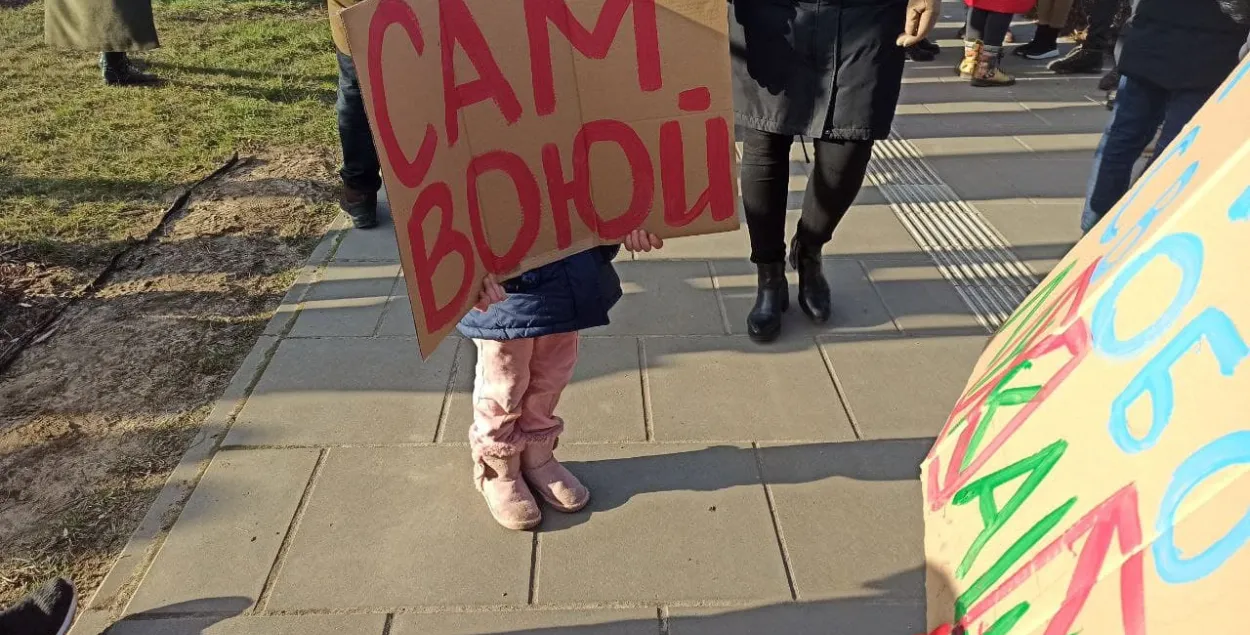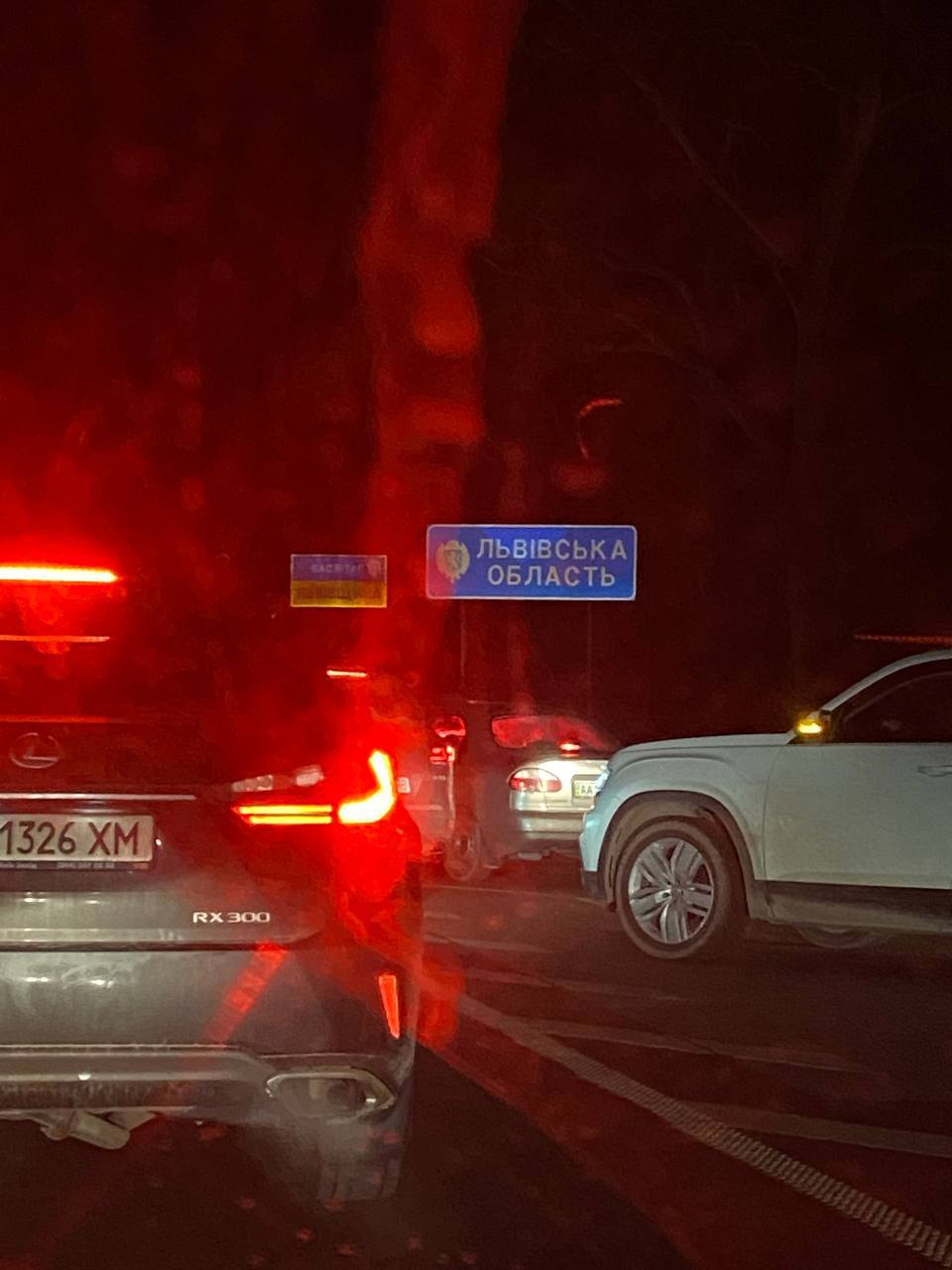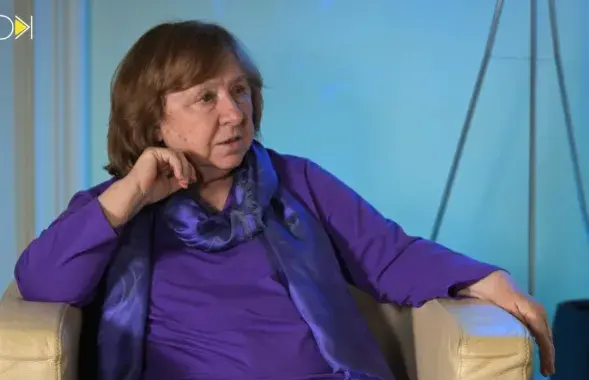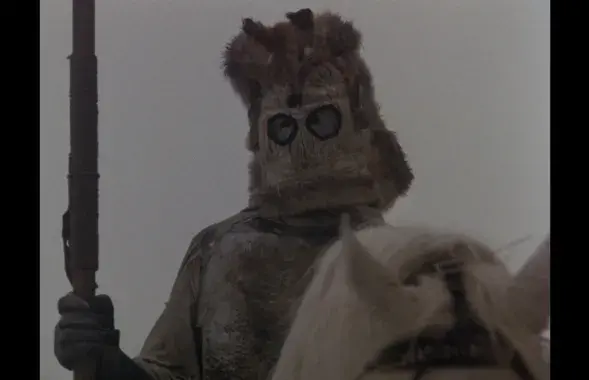Two stories of Belarusians who fled war in Ukraine

Anti-war rally of Belarusians in Warsaw / Euroradio
Ukraine has become a second home for Belarusians who fled repression after the 2020 presidential election. In 2021, they applied for nearly 4,400 temporary residence permits in Ukraine.
On February 24, Russia started a war against Ukraine and the Belarusians had to flee again. Euroradio has prepared two stories of evacuation in the early days of the war.
"Those who believed in the war were considered alarmists"
Viktoryia and Mikhail moved to Kyiv in May 2021. Before that, the young people lived in Minsk. She works in the IT sector and he previously was a lawyer, in particular the defender of journalist Katsyaryna Barysevich, a former diplomat Alyaksandr Sakalouski. The couple did not plan to leave but were on the lookout. At some point, life in Belarus seemed too dangerous for them, so Viktoryia and Mikhail decided to leave the country for a while.
"We slowly began to pack. We tried to make all the documents, and only three days before our departure we told our parents and friends about it. We prolonged the aggreement for the apartment, hoping to be back in two months, closed the door, and left." recalls Viktoryia.
In Ukraine, the family received a residence permit, had time to arrange their lives, and put up with the idea that Kyiv was their new home.
"We led an ordinary life. I went to pilates, played squash, walked the dog. We made a lot of Ukrainian friends, we started to immerse ourselves in Ukrainian culture. We didn't believe the talk about Russia attacking us. Not for a second. How could you believe it? Who bomns people in 2022? Those who believed it could happen were considered alarmists...
My husband later said that on the evening of February 23 he had some kind of premonition that the war would start. But I didn't really understand it, it was just as if his mood was gone.
On Thursday, February 24, we woke up to Misha getting a call from his colleague in Kharkiv who said they were being bombed! And that's when I heard a bang outside. We woke up to a new reality. It was five in the morning, four if you were in Poland. Just like in history books!
On the eve of the Russian invasion of Ukraine, information with bomb shelter addresses and appeals to put together an "emergency suitcase" was circulating in social feeds. We were skeptical. So we packed hastily after hearing the first sirens and the rumble of guns somewhere in the distance.
"We saw a reconnaissance drone being shot down Near Lviv"
That day they tried to pack and understand what to do after all: leave or stay? Minskers watched the news all day on TV and went down to the bomb shelter at the call of the siren several times - but still did not fully believe that this was really a war. In the morning, they heard the sounds of explosions, and during the day there was humming from the planes. They sounded like Ukrainian ones.
"We were living in Kyiv. Or do we still live there? We live near Druzhby Narodiv metro, it's not far from the center, and we don't have a bomb shelter there, but there is a parking lot on the underground floor, which is covered with a thick concrete slab. A shelter was set up there. The first time we went down there, we saw very few people. But the last time, people were already asleep there," says Viktoryia.
We decided to leave the next morning, together with our friends, when we woke up again to the sounds of explosions somewhere in the distance. We headed for Lviv. Six of us and two dogs in a friend's cab. We managed to fill the car the day before.

"There was awful road congestion on the way out of Kyiv, and it was scary. No one ever knows what or where a bomb would land! And I didn't think it would be like this... I am a citizen of Belarus, and I was afraid to drive along the Belarusian border. What if they could shoot from there? And we were checking the news the whole way: "Can we go there, has there been shooting for the last 20 minutes?" the girl says.
The road to Lviv took 22 hours. There were traffic jams, there were checkpoints between districts, but we got through without obstacles. On the way, we realized that it was in fact the war, Viktoryia said:
"In the Lviv region, we also got in a traffic jam. And it was really scary there. We heard the sound of something falling and a small explosion and thought a rocket was flying. The cars even froze for that second. We were told later that it was a reconnaissance drone being shot down. That was the first time we realized this was a war, almost two days after it started. My hands were shaking as I wrote to my parents".

In Lviv, the group split up. Viktoryia and Mikhail went to the train station, from where the trains go to the Polish border towns of Medyka and Przemysl. A crowd of Ukrainians, Belarusians and other foreigners who do not speak Russian were already waiting for them on the platform. No tickets were sold for these trains, they were declared evacuation trains. No one knew the exact departure time. In the confusion, people on the platform sometimes did not even go down to the shelter when the air-raid alarm sounded.
"We thought, what if a train is coming right now that can get us out of all this?" the Belarusian woman recounts her thoughts at the time.
"Warsaw streetcars sound like sirens"
Eventually, they did get on a train that looked like the Homel-Kalinkavichy train, as Viktoryia describes it. Some people said it was going to Poland, too.
"It was some kind of hell. I read in the chat that the trip could take up to 10 hours. Ha! It ended up being 20 hours. By this point, we had already been on the road for 24 hours, and hadn't slept in a day and a half. We had one powerbank, which miraculously didn't run out, and the food was two packs of cookies, two fitness bars, and a bottle of water. And since the bathroom stop was unclear, we tried not to eat or drink".
People were in a terrible state. Mostly women with children were on the train: they were crying and screaming, and hungry. They didn't allow us to open the windows, people started to collapse.
At the Ukrainian border, we stood still for a very long time. People arrived by bus, they were also put on that train. It had eight cars, and they said there were about 2,000 people on it. People were standing in the aisle, lying down, sitting on each other. It was horrible. I didn't feel like a human being there," Viktoryia recalls the experience with a shudder.
A couple of times, on the way, the Belarusians encountered not hostile, but caustic remarks about their nationality. I had to justify myself for holding a Belarusian passport.
As soon as the train arrived on the platform in Poland, border guards started handing out water and food: they passed them right through the windows of the train. The border guards asked no questions. Women and children were allowed in first, then the rest. People with a dog were let in without any problems. Volunteers were on duty at the checkpoint, there was food and water, plaid blankets were given, people were asked if they had anywhere to go and where to sleep, and it was possible to find a transfer to almost any city.
Eventually, Viktoryia and Mikhail made it to Warsaw. They could work remotely, but they only rented an apartment for a week. They have no answer to the question "What's next?"
"The scariest thing was when we saw a drone being shot down near Lviv, and when I closed my apartment in Kyiv because I closed my apartment in Minsk the same way nine months ago. Warsaw is safe, but I'm a little twitchy: the sound of streetcars is like the sound of a siren. We went to a Vietnamese cafe near our rented apartment in Warsaw, and I couldn't hold my chopsticks in my hands: they were shaking.
I don't know what's next. I hope we'll be back soon. Kyiv was our home. I loaded the dishwasher before I left. I hope it will be over soon and we'll be back home. Both to Kyiv and to Belarus. Ukrainians are very good people. It is a wonderful country, which sheltered a large number of Belarusians, gave us a home, supported us. It pains me to see the phrases that good must win because in Belarus it didn't. At least once. But I want to believe.
"I didn't sleep on the train so I could be ready to exit it during an emergency."
Yuliya, a filmmaker from Minsk, arrived with a young man. He's a developer at an IT company. They moved to Lviv recently -- in mid-January 2022.
"My boyfriend and I didn't really plan to leave. We wanted to stay in Belarus. They came to search Ulad's place of residence, and we decided we needed to think of our safety. We chose Ukraine. It was important for us that it was close to home and it's a country where we understand the language and which has a similar mentality," says Yulia.

We rented an apartment for six months. We settled in, began to get on with our lives. We followed the alarming news about the possible outbreak of war, of course, but we could not believe it.
"We did not believe it. Of course, we understood that there were risks, but still, we were in Western Ukraine. There were messages in the chats about stocking up on everything we needed and checking shelters near the house, but we honestly never did. And when the siren sounded on Thursday, we didn't really know where to run... - recalls Yulia.
The couple reacted to the news of the war without panic. They decided to leave at once. They thought they should try to go to another city in Ukraine first. They found train tickets to Uzhgorod. They packed and set out on the same day.
"There was silence on the train. Sometimes it stopped, the lights were turned off. It was very uneasy. And at the station, too, it was scary. After all, it's a strategic site. On the train, I couldn't sleep, I didn't even lie down, so that, if anything happened, I could be dressed and ready to exit quickly on alarm. All sorts of thoughts were in my head: what if they think it's not a passenger train, but a military one?" said Yuliya.
"People were watching the news and crying"
On the morning of Friday, February 25, there was also anxiety in Uzhgorod. The Belarusians set a course for Slovakia: the nearest town of Kosice was less than 100 km away. The bus ticket cost about 10 euros.
"The bus was to be there at 5 pm, but we had to wait till 12 am. They said there were long lines at the border, so the buses were late. Most of the women with children were waiting for the bus with us. Everybody was quiet, reading the news on their phones. In the waiting room, we saw a family. They were watching television and crying. I understood that the man - he looked about 50 or older - stayed and his wife had to leave but offered to wait a few more days, to see what happened," Yuliya shared her observations.
The bus to Slovakia, as the Belarusian recalls, was standing more than driving. They reached the border quickly but then were stuck in one place for a few hours. And no one knew how long it would last. So on Saturday morning, February 26, the couple decided to get to the border crossing on their own, on foot.
"Ukrainian border guards, apparently, were very tired and nervous. We didn't get the most friendly greeting due to our Belarusian passports. They asked why we were not going to Belarus, and why we came here in the first place. But in the end, we were let through. Slovak border guards, on the contrary, were very friendly. They spoke Slovak, and I was even surprised that I understood everything - their language is so similar to Belarusian! There were a lot of volunteers around the border crossing with tents, food, water, people with cars that offered a ride somewhere," says Yuliya.

The girl was allowed into Slovakia without a Schengen visa. She was given a document, a permit to stay anywhere in the country for 90 days. We were also lucky to get a ride from the border crossing to the nearest town Košice. A Ukrainian man, who had worked a long time in Slovakia and was living in two countries, agreed to give us a lift.
"We spent the night in Košice and decided that we would go to the capital, Bratislava, where various institutions are concentrated. I don't know what's next, whether we'll stay here or not. If so, I'll try to make documents on general grounds, and not in the status of a refugee," concludes Yuliya.
Author: Hanna Haradnichuk















